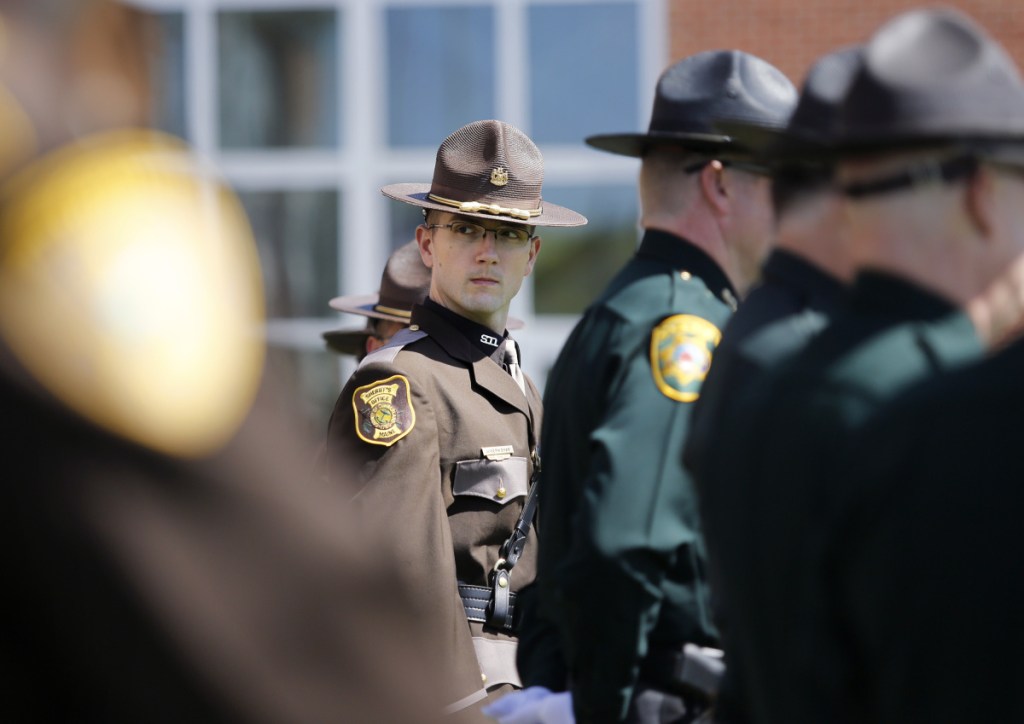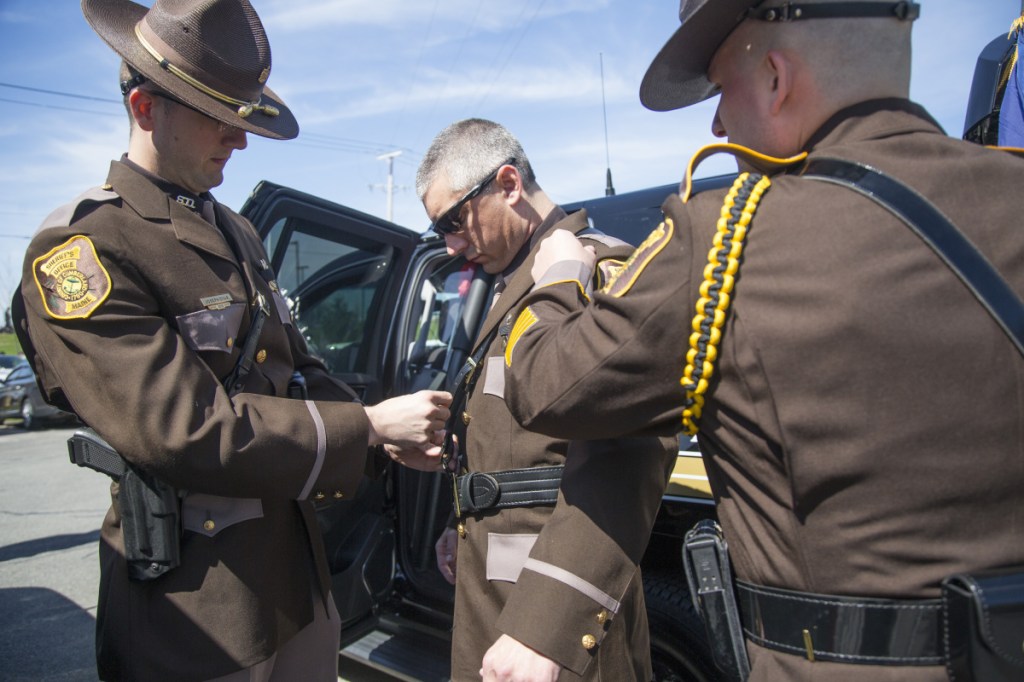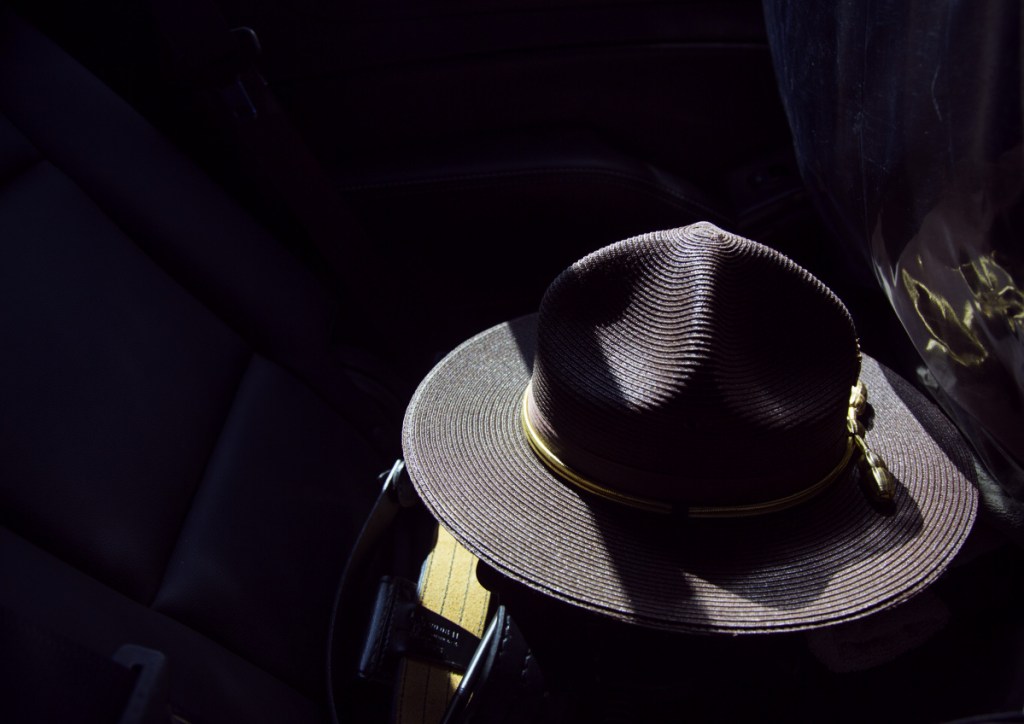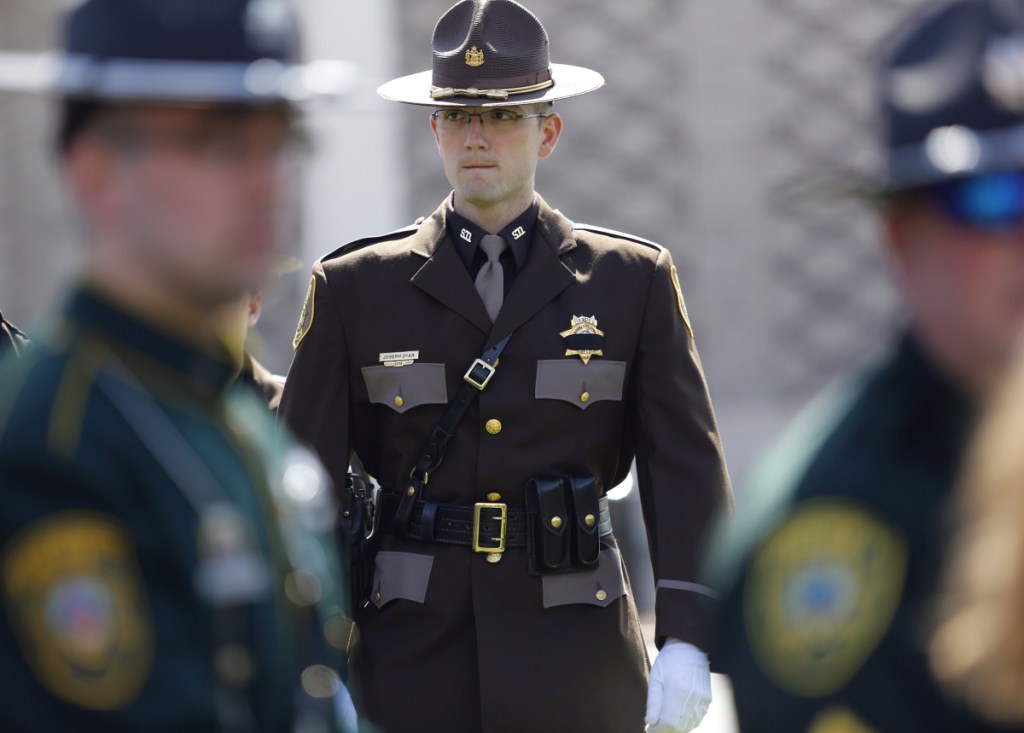It was 9:30 a.m., and Deputy Joseph Dyar’s long night had already turned into an early morning.
As a patrol deputy with the Cumberland County Sheriff’s office, Dyar’s regular shift ended at 3 a.m., but he didn’t get to his home in Windham for another hour. Two short hours of sleep later, and he was back in his cruiser, his dress uniform hung in the backseat under a thick plastic bag.
“Last night I didn’t have a dull moment,” he said. “It probably didn’t slow down until 1:30 a.m.”
He’s taken a personal day, but not because its his birthday, which it is — he just turned 30. Dyar was off so he could join the hundreds of Maine law enforcement officers, and thousands who came from out of state, to bid a final farewell to Cpl. Eugene Cole, who was shot and killed April 25 while on patrol in his hometown of Norridgewock.
Cole’s death, allegedly at the hands of another person, was the first such killing in nearly 30 years in Maine. For an entire generation of police it is a sobering reminder of what’s at stake, and why they train. In the day of mourning his loss, deputies like Dyar reckon with what their chosen profession means for their families, and seek comfort in their solidarity.
But first, there is the issue of the uniforms.
Once parked in Bangor, the Cumberland county deputies unwrapped their dress uniform coat, a brown jacket with a Patton leather belt that sits high above the hips, and a diagonal shoulder strap. Dyar straightened his collar in the dark tint of his SUV window like a mirror.
He tugged at the tails of his jacket, getting it to sit just right. Everywhere around him, police were fussing over other police. Dyar went over to the next SUV.
Deputy Cole Chandler was among the last to get suited up. Dyar approached, and began moving Chandler’s collar to smooth away the creases.
“Is that comfortable where it is?” Dyar asked.
“Is it supposed to be comfortable?” Chandler said.
Nearby, deputy Brandon Correia stood ready with a lint roller. On a day like this, the details matter.
In the scheme of things, Dyar said he didn’t think he would end up in law enforcement.
He grew up in Strong, where his dad was the fire chief. Dyar wanted to follow in the family profession.
But after pursuing fire science at Southern Maine Community College, Dyar realized the firefighter life didn’t suit him. He wanted to be an officer. The mission to help people was the same, but he enjoyed the work more, he said.
His father, Dyar said, is the kind of guy who would support anything he wanted to do.
“My mother was devastated,” Dyar said.
Why? “All of the different dangers.”
It’s been six years, but she still calls him to nudge him to seek a new line of work. After Cole’s death, it was no different.
“She sent me a message to ask if I knew him and if I was OK, and then she asked me if I wanted to be a doctor or something else,” Dyar said.
His wife, Jennifer, who is a full-time fire fighter, is also supportive, but when they met, Dyar was still pointing his ambitions toward firefighting.
When his wife heard the news, she called Dyar immediately.
That night, the emotion poured out. She could see herself in Cole’s wife, Sheryl, Dyar said.
On a grander scale, any chance of forgetting the danger is wiped away when about once a year, when Dyar and his wife go through the macabre paperwork of making pre-arrangments for a day neither hope ever comes.
They must decide, for instance, who must be contacted in the event of the unthinkable.
Which funeral home? What type of service? Should Dyar wear a police uniform in his casket, or should it be a suit? Are his finances in order? Does his wife know all the passwords to his bank accounts?
“She started dating a firefighter and ended up marrying a cop,” he said. “You spend years convincing your family that Maine is a safe state.”
For the most part, it is. But police still train for when things go awry.
“They always say it, and I believe it, that its OK to have fear,” Dyar said. If he didn’t have fear, he would be a danger to himself and others, he said.
But it doesn’t make it any easier, night after night, call after call, showing up to someone else’s worst day.
“I go to calls all the time and in the pit of my stomach I feel, ‘This isn’t right,'” he said. “‘Why am I even going?'”
At the Maine Criminal Justice Academy, which uses intense pressure and stress to teach the rigors of policing, the notion of danger is instilled throughout the process, both explicitly and otherwise.
Cadets review line of duty death in Maine, combing through the record for lessons to be learned, Dyar said.
Was it a dirty gun that jammed when it was supposed to shoot? Was the officer sleep-deprived? Did he fail to properly handcuff someone? Was his search of a suspect not thorough enough?
The details matter.
“Some people think we’re aggressive when we ask people to move back, or we move around people. Sometimes people don’t understand why we do that, and sometimes its more aggressive than we want it to be, but everyone who goes to work just wants to come home.”
After Cole’s death, the response among other Maine departments was immediate.
When word trickled out on April 25, Dyar, a member of the department’s tactical team, was ready to go help find the man sought for the crime.
When Dyar was dispatched north to Norridgewock, it was for a different reason. Since Cole was killed, two deputies have been detailed to the funeral home, including Dyar, who spent April 27 at the funeral home and in the Norridgewock area. When Cole was laid in his casket, two deputies stood by him, so he would never be alone.
On Monday at noontime, Dyar was in the front row of a seemingly endless column of police who lined a side street next to the Cross Insurance Center when the flag-covered casket bearing Cole’s remains was delivered in processional.
Once inside the arena, Dyar took his seat among nearly 1,000 other officers from Maine.
“We’re human, too, I guess. Sometimes it feels like you’re on an island as a cop,” he said, adding later: “We know if someone wants to hurt us, and they plan it, they probably can.”
Send questions/comments to the editors.







